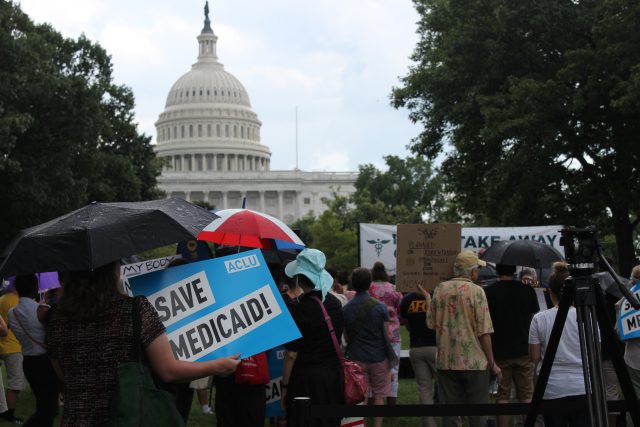How will Trump’s expected executive order on health care affect insurance markets?
WASHINGTON- President Donald Trump and Senator Rand Paul (R-Ky.) are claiming that an executive order that the president may sign next week will drive down premiums because it will allow consumers to buy health insurance across state lines, but some analysts doubt if it will help.
“The executive order in-and-of-itself won’t change anything it will simply-I presume-tell the secretaries of HHS (Health and Human Services) and Labor to move ahead with modifying some regulations,” said Heritage Foundation Senior Research Fellow Edmund Haislmaier.
“Once they get to that stage really the only regulations they can modify are ones that apply to the group market but there isn’t really anything there for them to change on the individual market,” he told TMN.
Trump told reporters Wednesday that he would sign next week “a very major executive order where people can go out, cross state lines, do lots of things and buy their own healthcare.”
The president did not provide details of the expected order.
Simon Haeder, who is an assistant professor of political science at West Virginia University’s John D. Rockefeller IV School of Policy and Politics, said Trump’s plan to sell insurance across state lines is not enough to provide market stability.
“The notion that allowing insurers to sell insurance across stateliness would magically solve problems like lack of competition or high premiums is ill-founded,” he said.
“It implies that there is a quick easy fix to the woes of the American health care system. Indeed, it does nothing to address the big issues like quality and costs,” Haeder added.
Paul, who has been working with the Trump administration to bring about greater market flexibility, said in a statement Wednesday that despite successive failures by the Senate to repeal Obamacare: “The health care debate is not over.”
“I believe President Trump can legalize on his own the ability of individuals to join a group or health association across state lines to buy insurance,” Paul told MSNBC on Wednesday. “This would bring enormous leverage to bringing down prices. It would also bring protection to individuals who feel left out, hung out to dry, basically.”
Paul was one three Republican senators who came out against the latest Obamacare repeal measure.
Republicans could only afford to lose two votes given that the Senate’s 46 Democrats and two independent members opposed the legislation.
Senate Majority Leader Mitch McConnell (R-Ky.) on Tuesday said the upper chamber would not vote on the proposal.
Republicans had hoped to pass the bill before September 30 to take advantage of budget reconciliation authority.
Reconciliation lowers the threshold for breaking filibuster and would have allowed the legislation to pass with a simple majority as opposed to 60 votes.
The Senate Budget Committee on Friday released a copy of the FY 2018 budget resolution.
The budget resolution includes reconciliation instructions for both Obamacare repeal and tax reform legislation but Republicans could jeopardize both initiatives if they are pursued simultaneously.
This article is republished with permission from Talk Media News

Bryan is an award-winning political journalist who has extensive experience covering Congress and Maryland state government. His work includes coverage of the election of Donald Trump, the confirmation hearings of Supreme Court Justice Brett Kavanaugh and attorneys general William Barr and Jeff Sessions-as well as that of the Maryland General Assembly, Gov. Larry Hogan, and the COVID-19 pandemic.
Bryan has broken stories involving athletic and sexual assault scandals with the Baltimore Post-Examiner.
His original UMBC investigation gained international attention, was featured in People Magazine and he was interviewed by ABC’s “Good Morning America” and local radio stations. Bryan broke subsequent stories documenting UMBC’s omission of a sexual assault on their daily crime log and a federal investigation related to the university’s handling of an alleged sexual assault.

